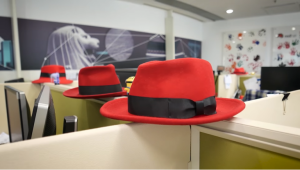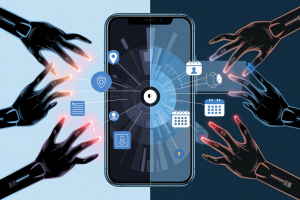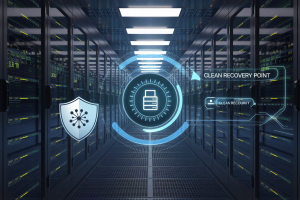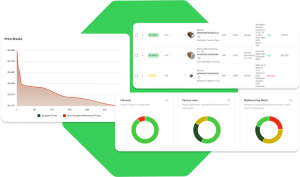Hold Your Horses, Slate. Desktops Can’t Fly!
I don’t do a whole lot of writing on the weekends, and I certainly don’t do it at 3:00 AM on a Sunday morning. This morning is different. I’m not sure if it’s due to the pre-Father’s Day nap I took earlier yesterday, a bout of insomnia, or that the article I just read on Slate entitled “Flight of the Desktops” has inspired me to once again rise to meet the role of the “Internet’s Ombudsman.”
Whatever the case, I just can’t let this article pass without comment.
![]() The gist of the post, by Slate’s Farhad Manjoo, rests in some numbers put out by Forrester that says by 2015, the Desktop PC will be more or less a dead object, with 18% (“or less!,” says Manjoo) marketshare.
The gist of the post, by Slate’s Farhad Manjoo, rests in some numbers put out by Forrester that says by 2015, the Desktop PC will be more or less a dead object, with 18% (“or less!,” says Manjoo) marketshare.
You can dig into his reasoning in greater depth at his post there – I won’t stop you – but I think his irrational exuberance for the death of the PC and the life of the iWhatever may be taking him to a place where there really is no defense for being.
According to Forrester projections, the tablet PC is going to be the thing that absolutely kills off the desktop. I’ve copied the graph here so you can see this dystopian future they’re projecting. I can’t tell you how they’ve arrived at this prediction of the future, but I can tell you one thing – so long as this world relies on keyboards and mice as the most efficient ways of managing productivity tools on a computer, there is absolutely no way you can achieve any sort of real takeover in marketshare from desktop PCs to tablets.
The Benefits of a Desktop
The desktop has a great number of things going for it, despite it being a generally ugly, boxy thing.
First and foremost, they’re cheap. Up until the existence of the netbook a few years ago, there was no cheaper way to get access to, well, everything from your home without buying a desktop PC. We in the tech bubble often forget that price is a factor in most people’s technology purchase decision making.
That’s part of the reason why I feel companies like Clear and MetroPCS have a much brighter future in the mobile industry, and pay attention to them, while my peers seem to be always endlessly focused on whatever shiny object Steve Jobs is doling out.
Almost just as importantly, desktop PCs are more usable than any other type of machine. Admit it – you hate typing on you’re phone. Every new form of input device upgrade they add to your tiny little smartphone is really just a kludge. The buttons are too small, pulling up the on screen display is a hassle, and Swype and it’s ilk, for all their convenience, are still less efficient than even the worst hunt and peck efforts on a full sized keyboard.
I haven’t used a desktop PC daily for almost four years. I’m an edge case, though, and I still desperately miss my klickety-klack keyboards with ample room for my fingers. Even better, though it lacked the retro-feel of my favorite noisy keyboard are those ergonomically designed keyboards where the buttons are separated down the middle, eliminating the need to angle my wrists oddly while typing. No netbook can provide that level of ergonomics, and certainly no smartphone or tablet can allow for that.
Here’s another big reason why we’re stuck with desktops for the foreseeable future: We’re generating more data than ever. My wife and I spent the better part of our Saturday cleaning out one of our closets – the one full of knick-knacks, important paperwork, family photos and irreplacable videos. Because I do have a few tower PC systems sitting around the house, it was obvious to me that the data sitting in those four or five large cardboard boxes wouldn’t come close to filling up a $200 hard drive in a PC somewhere in the house.
That’s a practical reason for a geek to have a home server – what about the rest of the world? In case you haven’t noticed, there’s a move within the consumer facing industry players to create a need for a home computing space – almost a mini-cloud. Microsoft has been ebbing away at this with it’s XBox – Windows 7 integration, and hoped to make even further strides at total system integration by creating the Kin. The whole set-up is engineered to be a hybrid public-private cloud situation for the family unit.
Apple’s doing it, too. The tablet, the Apple TV, the iPhone, the Mac series. Everything that exists on the iOS is there to further create need for heavier computing power when you want to actually do something with that data. So long as you buy products from Cupertino, you should have no issues moving data from one part of that public-private cloud to another.
Until There is Input Device Innovation (and really awesome broadband), We’re Stuck with Desktops
What could possibly kill the need for a desktop? There are a great number of ways to skin that cat, but the easiest and most fundamental route to killing the need ![]() for a desktop sits outside hardware manufacturers’ control.
for a desktop sits outside hardware manufacturers’ control.
In Manjoo’s post, he quotes Forrester analyst Sarah Rotman Epps:
Indeed, it seems just as likely that desktop sales will drop faster than Forrester projects. In her report, Epps points out that desktops still offer more processing power per dollar than laptops—in other words, for the same amount of money, you can get a faster desktop than a laptop. As a result, Epps says, people with "processor-heavy" needs—people who want to edit high-definition video or play a lot of PC games—will keep the desktop market alive over the next few years.
But I suspect Epps might be overstating the attractiveness of very powerful machines. The rise of netbooks and tablets proves that, for many tasks, consumers are OK with sacrificing power in favor of portability. What’s more, in the future much of the "power" in our computers will come from the Internet. You probably won’t even need to store or edit your music, movies, and other files locally for long—we’re getting better wireless network drives and Internet-based storage systems, and soon all your media will reside in a central location (in your house or some far-off server farm) accessible to all your machines. You might even be playing graphically-rich games over the Internet soon, too.
It’s hard to imagine this world that Manjoo envisions as the counter to Epps world, unless you’re disconnected from the reality of the USA’s broadband market.
The telcos and the cablecos are not focused on innovation. I watch very closely what comes out of both sets of industries, from inside sources as well as what’s publicly available. Whether they realize it or not, their focus appears to the rest of the world to be on how poorly they can treat their customers while providing them the slowest access speeds. Their only motivation to ever improve quality on either front is to prevent full scale violent attacks on their company headquarters.
Keep in mind it was not always this way – I worked at what is now one of the US’s biggest cable companies in the 90’s, when it went (over the course of three years) from being a mom and pop dial-up shop to being the nation’s second cable modem access provider. As an independent entity, the company was very focused on the cool technology, being bleeding edge, and going over and above in efforts to help their customers. After our being bought by a large cable company, their culture started gradually to infiltrate our own. It’s now around twelve years out from the original buy out, and I can tell you that not a single person from the original internet team still exists in their corporation now.
The telcos aren’t much better. They’re stuck in a mindset wrapped up in the delivery of voice communication and hampered by the slow buildout times that come with operating a wireless network that spans a continent. Even if they wanted to, upgrading everyone’s wireless communication speeds to a fraction of what exists in other parts of the world wouldn’t be an instantaneous thing.
Given that our networks are slow and will be slow for the foreseeable future, the magic and wonder of all data living in the cloud for consumers is a fantasy. Editing video on the cloud will never happen in this environment, particularly with the advent of consumer HD cameras. A ten minute clip is easily 100 ![]() megabytes, which generally takes well over 20 minutes to transfer on the better internet connections in this country (and I still haven’t heard yet of a dongle that will go directly from my new Sony Handycam to an iPad or a smartphone of any type).
megabytes, which generally takes well over 20 minutes to transfer on the better internet connections in this country (and I still haven’t heard yet of a dongle that will go directly from my new Sony Handycam to an iPad or a smartphone of any type).
We’re stuck with slow internet, but we’re stuck with even slower input devices. The iPad and any smartphone out there doesn’t improve the speed at which we’re able to digitize what’s in our heads – it slows it down. The keyboards we all use and view as the optimal way to input information were invented around the late 1800’s. The mouse was created in 1963. We’ve made minor improvements on both, but by and large, we haven’t improved the way we put input into machines for 130 years for text.
That’s why I get excited about technologies like Project Natal / Kinect and to a lesser extent older but interesting innovations like the Twiddler and the Dasher.
Until there is a technology that allows us to, while on the go, achieve input speeds that exceed what’s possible from traditional input devices, the need for a “let’s sit down and get work done” station will always exist.
Don’t get me wrong, I firmly believe in the concepts of convergence and the inevitability of wearable computing – the market segments that will suffer there aren’t the desktop / laptop segments, though. Those machines provide far too much value – bang for the buck, if you will – to be killed by tablet.
A message from John Furrier, co-founder of SiliconANGLE:
Your vote of support is important to us and it helps us keep the content FREE.
One click below supports our mission to provide free, deep, and relevant content.
Join our community on YouTube
Join the community that includes more than 15,000 #CubeAlumni experts, including Amazon.com CEO Andy Jassy, Dell Technologies founder and CEO Michael Dell, Intel CEO Pat Gelsinger, and many more luminaries and experts.
THANK YOU









